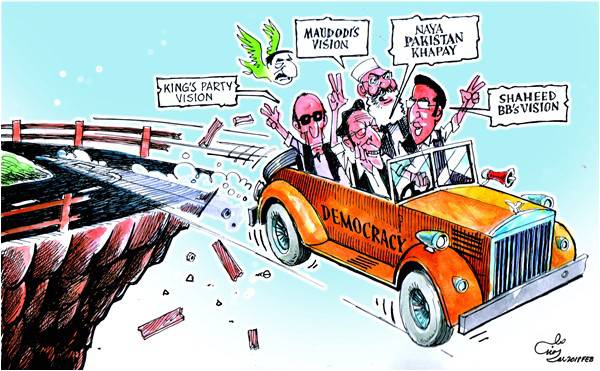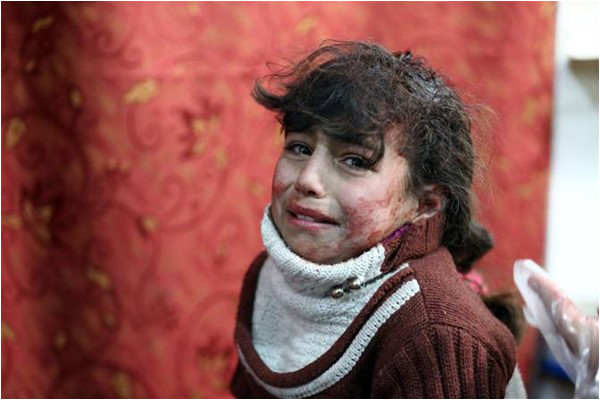
Syria’s killing fields
Sir,
Syrians have just been through one of the bloodiest weeks in their modern history splattered as it is with the ravages of war. During this calamitous period alone up to 500 people were killed in a series of deadly bombings carried out mainly in the suburbs of Damascus. And the world has at last partially awoken from its deep slumber. The 30-day ceasefire called by the UN Security Council under a unanimously passed resolution was a much-needed gesture but it is unclear whether the parties involved in the conflict will ever comply with it fully.

Earlier, the Security Council vote was in itself hit by procrastination. Many hundreds of lives could perhaps have been spared had its members acted more swiftly. The credit for the UN resolution must eventually go to Sweden and Kuwait for sponsoring the move and succeeding in winning over Russians who objected to the ceasefire. For the present, however, the focus is on delivering humanitarian aid to millions and evacuating those critically ill or wounded in the latest escalation of hostilities. If we do not see any cessation of hostilities, there won’t be any decent flow of humanitarian relief, and thus another opportunity would be lost. Emergency aid is needed by 13.1 million people in Syria, including 5.6 million people, almost half of whom are living in besieged locations. Only a durable humanitarian pause can ensure immediate access to aid and services. The Security Council is likely to discover sooner than later that implementing the ceasefire resolution is going to be harder than adopting it.
For years now a political settlement has eluded the Syria conflict. Russia, one of the strongest backers of Damascus, believes the cessation of hostilities is an unrealistic objective as such and can only be guaranteed by concrete, on-the-ground agreements. To address all the major irritants would perhaps be impossible but instead, it is worth striving for small steps to end the war. Through these steps of say, temporarily halting the fighting or declaring no conflict zones, one could achieve smaller objectives that could each serve as a turning point. But before that happens all sides in the conflict will have to bring their influence to bear.
Syed Ansaar Ahmed Shah,
Via email.
Betel nut crisis
Sir,
This is written following the recent ban by the PFA over the production and sale of betel nut (chaaliya) which was imposed on January 28, 2018. This ban was an outcome of the meeting held at PFA’s HQ chaired by the director of the PFA General Noor-ul-Amin Mengal. Taking under consideration the harmful effects of the product on the health of the consumer, members of the authority agreed for a direct ban. The director stated: “A large number of people, especially youngsters, are suffering from Oral Submucous Fibrosis (OSF) and the patient cannot open their mouth. Strict action as per the relevant provisions of the PFA Act 2011 shall be initiated against them after April 30.”
Considering the fact that a vast number of people and traders who are involved in the betel nut business, this may lead to uproar in the import business. Many traders have decided to move to the court in opposition to the ban imposed by the Pakistan Food Authority. PFA spokesperson Hafiz Qaiser has stated that the PFA itself was not the only one which came up with the decision to ban the product but it was concluded after exhortations from medical teams and scientists.
Syed Shayan Ahmed,
Karachi.
Baloch schools
Sir,
Education is not all about studying and getting high marks. It is a way to discover things we don’t know about and increase our knowledge. Educated people have the ability to differentiate between right and wrong and are aware of their responsibilities in society.
A person getting an education is not only gaining something from it, but also contributing to the growth of a nation. It is an inner light through which we can enlighten the world around us. “Without education, a child is like a bird without wings.”
Despite an education emergency imposed by the provincial government, according to some data, 963 schools out of over 13,000 schools in Balochistan have yet to be made functional.
Balochistan Education Secretary Shan ul Haq has said that a lack of buildings and teachers are the main reason. Though the number of out-of-school children has gone down from last year’s 24 million to 22.6 million, the statistics still paint a gloomy picture. Balochistan tops the list of out-of-school children in the country with 66 percent. Sindh comes in second with 51 percent. In Balochistan, girls’ education has been destroyed and there are not enough schools in rural areas.
Many primary schools have only one teacher. A report by Pakistan Education Atlas 2016, said that 36,408 primary schools are being run by one teacher. Teachers are absent, construction is below par, there are no textbooks and libraries, there is a shortage of electricity, drinking water, and chairs.
A survey in 2015 by Aser revealed that in Balochistan more than 60 percent of class five students cannot read English books for grade 2 and 55 percent cannot read Urdu books of class 2!
“I feel disappointed that I am a pauper but my sons will be the same because our dreams are being crushed by poverty,” said a 25-year-old man.
Recently Alif Ailaan rallied in Panjgur for the promotion of education reform. It focused on encouraging the government to make education a priority. Politicians can build schools, improve standards, and get teachers into classrooms.
The government will have to take the responsibility for every child.
Munaj Gul Muhammad,
Via email.
Pakistan’s exports
Sir,
In its annual report for 2016-17 the State Bank of Pakistan has described Pakistan’s GDP growth rate as 5.3%. The Pakistan Business Council agrees in its report dated Jan 17, together with economists such as Dr Hafiz Pasha and Dr Ishrat Husain.
Is this growth sustainable when Pakistan’s annual imports in 2016-17 are $48.6 billion and exports $21.7 billion? This leaves a gap of $26.9 billion that is partly covered by remittances of $19.3 billion. We are $7.6 billion short. And ultimately, exports are the only way to close the gap.
Countries that succeed economically focus on exporting instead of solely concentrating on the home market i.e. import substitution. The home market is the easy option as it is shielded by high protective tariffs that allow high profit margins, which is an implicit subsidy from the consuming public.
If competition is the whip that keeps business on its toes, endless protection spells the ruin of Pakistan’s manufacturing ability. Every country needs imports and therefore, the ability to pay for these imports in foreign exchange is crucial. Pakistan has not been able to develop this ability.
Without earning sufficient foreign exchange by exporting to at least cover the foreign exchange cost of importing, no country can be called a viable entity. The core importance of exported manufacture has still not struck the minds of either the Pakistan government or businessmen. What is being described as a 5.3% GDP growth is growth at artificial national prices made possible by protective import duties. A true comparison would be GDP calculated at international costs and selling prices. This would reveal that new wealth i.e. GDP growth, is not being created; it is being eaten away by the bulk of our manufacturing industries which devour wealth created by other sectors. What is true of our manufacturing sector has now spread to other sectors like agriculture which used to be net wealth creators.
With each passing day Pakistan is probably becoming poorer and this explains the dearth of jobs, the lack of investment and people running away to other countries. What must Pakistan do to climb out of this mess? It must do what has worked in the case of other countries e.g. China. What China did was to adopt the strategy of exported manufacture by establishing selected export processing zones allowing first class infrastructure with guaranteed electricity, gas, water, etc. The distinguishing feature of these export zones was the abolition of all taxes: no income tax on companies or their employees, no sales or excise tax, no property tax, no import or export duties i.e. complete exemption from all taxes.
A government is entitled to tax its citizens, but has no jurisdiction over foreigners. Yet governments try and slip in a tax or two with predictable results: their exports become less competitive in price and are rejected. These export zones would be prevented from accessing the domestic Pakistan market; their output would be exported only.
Finally, a competitive exchange rate is an absolute must and this is being done successfully by China, Vietnam, Bangladesh, Ethiopia and Kenya.
Mazhar K. Hussain,
Karachi.

